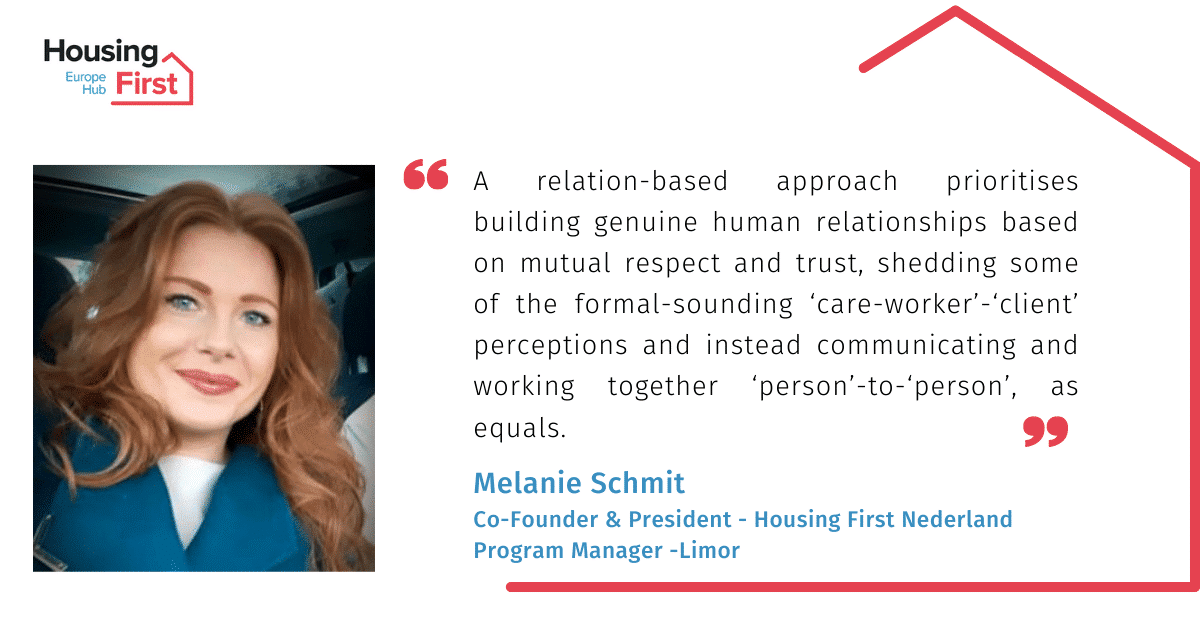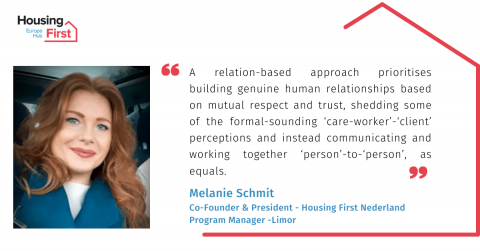
After more than a decade of working to help people experiencing homelessness in the Netherlands, I’ve been thinking about what sets Housing First apart from an experience perspective. Aside from providing a stable long-term home and supports for service users, how is the care provided different from other approaches in the homeless sector? What does that mean for the people working for us, with us, and the people we serve?
As I see it, what really sets Housing First services apart is not just what the service provides, but how it is provided and the core principle of taking a relation-based approach.
Professional proximity vs. professional distance
The classic care worker-client relationship is all about the client and their needs, whereby the care-worker works to serve these needs and does not let their own personality get in the way of the client. Even more so, they are taught not to and instead strive to maintain professional distance.
The Housing First approach shifts the focus from the individual to the connection between care-worker and client, because this is the space where trust is built and a healthy support relationship can be formed. Recognising that every person is an individual with specific needs, a relation-based approach prioritises building genuine human relationships with front line workers (FLWs) based on mutual respect and trust, shedding some of the formal-sounding ‘care-worker’-‘client’ perceptions and instead communicating and working together ‘person’-to-‘person’, as equals.
Because Housing First is based on unconditional acceptance and trust through ongoing, honest dialogue, this in turn helps to lay the foundation for healthy communication, behaviour and recovery. Housing First is eminently suited for this kind of approach, which could better be called professional proximity.
Support, empowerment and autonomy
Housing First supposes that the role of support is not necessarily to ‘fix’ people, but to teach and enable them to help themselves, while providing a safe environment in which to do so. It also discards the assumption that a service worker has a better understanding of someone’s needs than the person does themselves. The service user is recognised as the main character in their own life and Housing First FLW and services support and empower them to feel in control of their choices. The process is based on the notion that autonomy is the start of recovery. It is the conviction that if given the opportunity and the resources to do so, people are able to find the answers to their own questions, and that the support should enable them to do so.
Respect and connection
Housing First is more highly regarded by participants than other schemes because FLWs genuinely listen and offer full attention and acceptance. Housing First workers know it is all about connecting; meeting people where they are, not where we think they should be. Good FLWs don’t interpret, diagnose or make quick assumptions. They observe, so the service user can show who they really are, and then the FLW has the chance to provide individually-tailored support. That way, the options are back where they belong – with the person using the service making the choice.
A Housing First FLW enables the service user to dictate the agenda and forget about their own. The instrumental questions are: how do you want to live your life? And what kind of support do you need to do so? They even decide what support will be accepted, who from and when.
Housing First proposes that it is not up to the professionals to decide how people should behave and live their lives. Hierarchical relationships are therefore frowned upon. There is no control, there are no sanctions. In doing so, the focus shifts from helping to learning together. People using Housing First services are regarded as capable and responsible human beings and the Housing First FLW will not take on the role of advisor or troubleshooter unsolicited.
More than ten years of experience, backed by research and evidence from services around the world have shown that Housing First works, and especially for people for whom regular services have proven to be unsuited. The compassion and dignity of the Housing First approach for workers and service users alike is what really sets it apart, and the results speak for themselves.
Melanie Schmit
—
About the Author
Melanie Schmit is Co-founder and President of Housing First Nederland, Program Manager of Limor and a Housing First Europe Hub certified trainer.
Melanie is passionate about scaling up, further developing, and promoting Housing First in The Netherlands, as well as training groups and organisations on Housing First.
Follow Melanie on social media:
Twitter: @Melanie_Schmit
LinkedIn: Melanie Schmit – Voorzitter Housing First Nederland | Programmamanager Housing First bij LIMOR
